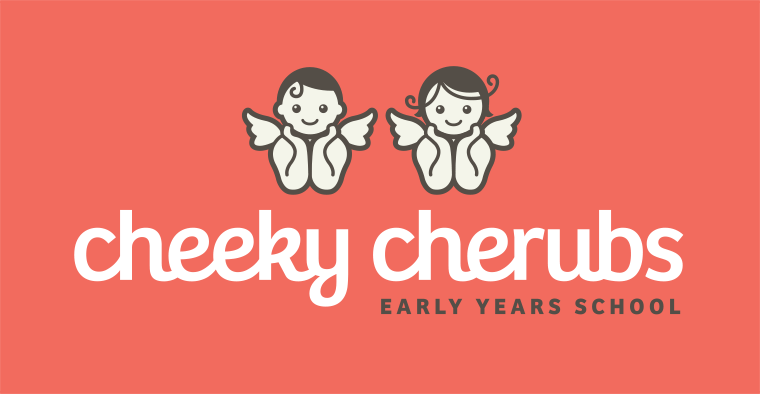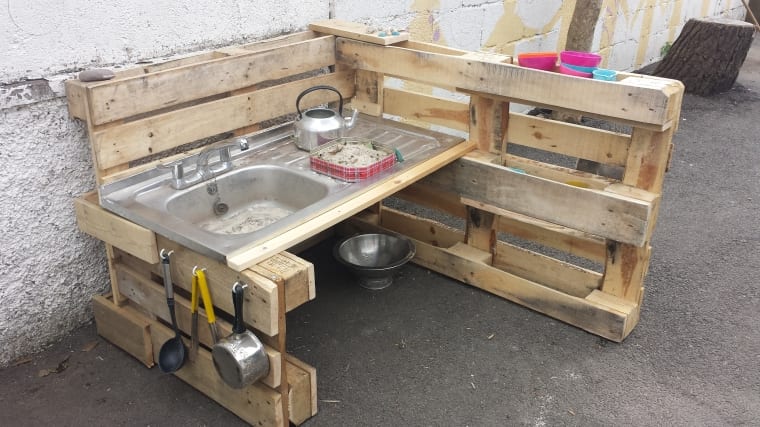Dirt, sand, water, bits of plants, and kitchen utensils comprise an eternal play kit. Living in Ireland, with a wet climate, we have the raw materials essential to messy play at our fingertips. Mud play in particular allows children to gather knowledge about the physical and natural world. We recently set up a Mud Kitchen in our Bishopstown service. It has been a huge hit!!
Mud kitchens are more than a digging patch. They comprise of elements from the Home Area, enriched with elements from nature and the Outdoor Area. We provide the pots, pans, bowls, cups and cooking utensils, while nature offers the mud, sand, water, grass, leaves, feathers, you name it, for the children to play and create. Creating our own unique kitchen from discovered and recycled items, in collaboration with the children adds character.
The Mud Kitchen provides a fantastic sensory experience. It comes in many forms; it can be dry or wet, clumpy and rough or soft and smooth. It is open ended, allowing for a range of challenges to meet different developmental levels and interests. Some of the younger children simply enjoy the sensory experience of playing in the mud (gritty, cool, stony, sandy, smooth, black/brown, tempting to the tongue), while other children may investigate further and see what happens when water is added. The older children and preschoolers are serious about measuring precise quantities of water and dirt to create the perfect mud dish.
Families can be wary about the idea of mud play. However the benefits and learning opportunities it allows should help outweigh any doubts. In terms of hygiene, there has been a significant amount of research which supports the fact that mud play is safe play. Exposure to germs and healthy bacteria in the early years can create a stronger immune system which is less susceptible to allergies. We must remember skin is waterproof and that dirt washes off! And this is also where the all weather gear, “Puddleducks” comes in handy J
How children learn from mud play
- Social and Emotional Development
e.g. let’s cook dinner, let’s have a restaurant, let’s feed the baby
Our Mud Kitchen is a great place for social play. Children learn to work cooperatively in small groups, complete tasks, enhance communication and social skills, and experience pride when completing creations. Playing in our Mud Kitchen has created opportunities for real co-operation in play from cooking and sharing a mud feast to joining forces and searching for worms. It provides so many different creative opportunities to play together. Our Mud Kitchen also encouragesthe development of positive dispositions such as independence, curiosity, and responsibility.
- Physical Development and Health
As mentioned above playing with mud and in the Mud Kitchen builds a stronger immune systems. It is well documented that exposure to dirt at an early age is thought to boost the immune system meaning that children who are allowed to get dirty at an earlier age are less likely to suffer from allergies and are more able to cope with germs later on in life. Being outdoors in nature also helps children relax. Being outdoors in the fresh air and connected to a natural living system positively affects blood pressure, outlook on life and stress reduction.
- Social Studies
Growing affection for our earth—soil, stones, sand, and growing plants connects us directly with the natural world. It lets our children get up close and personal with nature, discovering different mud in different places, the creatures that live in the mud and the plants that grow in it. Worms go hand in hand with mud and are a constant fascination for many. We can experiment repeatedly, knowing there is a limitless free supply. Mud is one of the most basic elements of the earth and allows us to develop an appreciation for the environment as we experience its diversity. For many of us mud play would factor in some of our earliest memories of playing outdoors.
- Creative arts
Children express their creativity while using the mud kitchen. The mud is an art medium that children mould and decorate in unique, creative ways. The creations become the centre of children’s play. They sell them in “the shop”, eat them in “restaurants”, celebrate at “birthday celebrations”, and serve them at “dinner”. The children use the kitchen utensils with control and intention, stirring, flipping, and pouring. Adding small ingredients to their creations allows them to use their fine motor skills.
- Science and Technology/Mathematics
e.g. how to make soup thin or thick, how to make mud meatballs stick together
Measuring skills are fine-tuned, and cause and effect happens right before the children’s eyes and in their hands. It is an exciting experience that has learning happening the best way possible—through play! There are many opportunities to practice emergent science and math skills, such as observing and classifying materials and processes, experimenting, predicting, drawing conclusions; measuring; investigating volume; asking questions; solving problems; and testing theories. On trips for new materials children learn the names of plants, trees, and seeds and when carried out through the four seasons children observe the changes in the foliage.
- Language, Literacy and Communication
Literacy is also an important component of the kitchen. Textures abound, descriptive language is impossible to avoid. Using photo and word labels, recipes and written and drawn directions for cleanup allows children to understand and use a variety of words and phrases. Children begin to see print as a source of information and a way to communicate with others. They practice reading and writing skills, match symbols and print, and increase their vocabulary.
We look forward to getting as much out of our Mud Kitchen this year as we did last year, extending the learning even further. Please don’t be afraid to come out and join in with our play!

